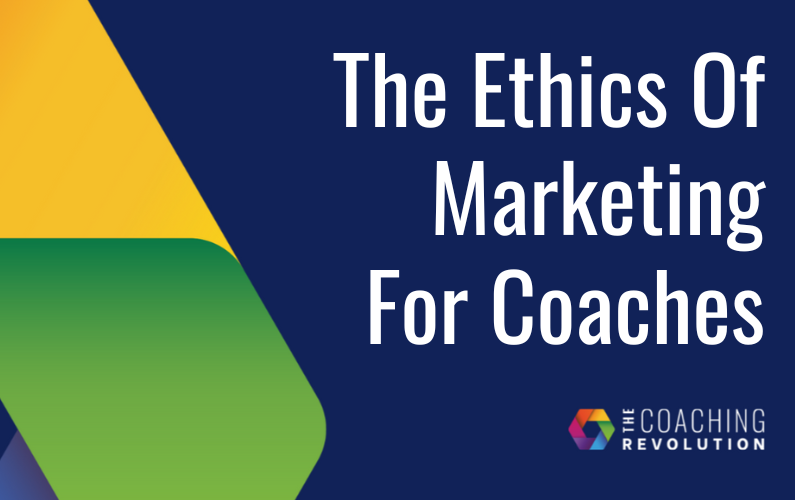As professional coaches, we have a code of ethics. Whether we’re ICF, EMCC or AC trained (or any of the myriad of other professional qualifications) the ethics part of our coaching really matters. It matters to us and to our clients.
Ethics of Marketing
Here’s the thing, good marketing is ethical too. It crosses no core values, it promises no miracles, it simply says I see you and the thing you’re struggling with, and I can help.
We all know of coaches who make outlandish claims in their marketing. Those who seem to be promising the earth and honestly, it makes your flesh crawl, doesn’t it? The truth is that marketing doesn’t have to be lies and overblown claims. Marketing can be – should be – honest and comfortable.
How Marketing Differs From Coaching
During the coaching process, you, the coach, have your focus on the client sitting in front of you. The client gets to determine the direction and outcomes of the conversation. Coaching is all about each individual in the moment.
During the marketing process, you, the coach, have your focus on one particular client – your ideal client avatar. This client is someone who has a huge problem that can be solved through coaching. The problem that we coach/marketers have to come to terms with, is that this person is probably not aware of the coaching process, so they don’t actually realise that coaching is the solution to the problem they’re grappling with.
However, you know that coaching is the answer and so you can speak to this particular kind of client with love, honesty and integrity about why they’re struggling, what their life could look like without the problem they’re grappling with, and why they might want to have an initial conversation with you to explore what their life could be like with this problem removed.
Marketing talks of outcomes, not processes. This isn’t just for marketing coaching it’s true for all marketing. The fact is that we always buy outcomes. One example of this is that we don’t buy insurance, we buy the peace of mind of knowing that if something unforeseen and unfortunate happens, we’re covered.
Two Assumptions
To market coaching effectively, there are two assumptions with which you need to work.
The first is that you will show up to every coaching session as the best version of yourself that you can. You will bring your most professional self to the session. You will have done whatever you need to, to leave your own stuff at the door and come into the coaching space as a great thinking partner – the very best you can be.
The other assumption is that your client will be the very best version of themselves too. They will show up for every coaching session with enthusiasm, they will take all the actions that they create in each coaching session, they will be accountable, and they will – in short – be the very best coaching client that they can be.
If those two things are true, then you can – ethically – talk about outcomes that your client can reasonably expect from working with you.
Contracting, Conversations and Ethics
In your first conversation with a new client, it’s important that you explain this to them.
You need to help them to understand that what they’re about to embark on is an active process in which they will need to participate. That they have to do the work themselves because you can’t do it for them.
You need to explain to them that if they do the work, they can achieve the outcome that they’re seeking. (May I remind you that you will have identified a problem that can be resolved with coaching. This part must be true for you to be able to market ethically!)
This honest and upfront conversation is what separates ethical marketers from those who promise the world and don’t deliver.
How Do I Choose A Problem That Can Be Resolved By Coaching?
This is a great question, and it’s the million-dollar question. A good place to start is here:

Recent Comments